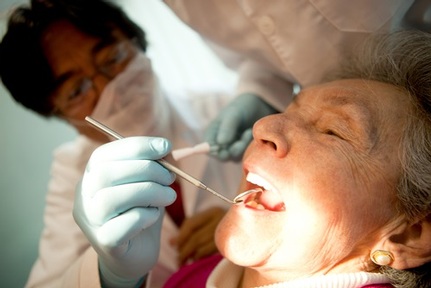Don't neglect dental health, NICE warns care homes
More than half of the older people living in Britain's care homes have tooth decay, far more than the number of those who don’t live in a care home, prompting NICE to publish new guidance for the sector.

It is estimated there are more than 400,000 adults living in UK care homes and the majority of those over 75 are suffering from tooth decay, compared to 40 per cent of people over the age of 75 who don’t live in residential care.
This is according to Public Health England's December report 'What is Known About the Oral Health of Older People in England and Wales'. The report has prompted new guidance by health watchdog NICE (National Institute for Health and Care Excellence) calling on all care homes to prioritise oral health and access to dental treatments, because it is just as important as other aspects of general health.
Referring to the guidance ‘Oral health for adults in care homes' , Professor Gillian Leng, deputy chief executive of NICE said "This is about maintaining basic human dignity in those who may need help in looking after themselves”.
“When oral health is ignored or poorly delivered in care homes it can lead to unhappy, irritable residents and for those with dementia, who often can’t describe problems with their teeth or gums, pain and infection may go untreated and worsen."
’We know oral health is too often neglected’
Professor Leng added: “Whilst some care homes provide good daily oral health for their residents, we know oral health is too often neglected.
“Our guideline calls for simple changes that could vastly improve the oral health and quality of life of people who are living in care homes across England.”
The NICE guidance recommends ensuring:
• All residents have an oral health assessment when they enter a care home with the results (including treatment needs) entered into personal care plan. (This should be done 'regardless of the length or purpose of their stay').
• Staff are properly trained to confidently look after the oral health needs of residents.
• Residents get access to local oral health services, when needed.
The NICE guidance highlighted the importance of routine daily mouth care, for those who may not be able to do this for themselves (including brushing natural teeth with fluoride toothpaste twice a day), daily oral care for full or partial dentures and daily use of mouth care products prescribed by dentists.
Older adults in care homes have complex care needs and are more likely to have fewer natural teeth. Those with teeth are less likely to have enough teeth to eat comfortably and socialise without embarrassment.
Public Health England's December report 'What is Known About the Oral Health of Older People in England and Wales' highlighted how care home managers experience much more difficulty in accessing dental care for their residents than older adults who live at home do, dental services are patchy and often no regular or emergency dental care arrangements exist.
“Awareness of oral health needs to be raised within care homes and we want to see more staff given training about what they can do to help”, said dental public health consultant Professor Elizabeth Kay, foundation dean of Peninsula Dental School, Plymouth University.
Professor Kay added: “The daily routines recommended in the guidance will help prevent problems and assist adults in care homes to have a comfortable, pain-free mouth.
"“Everyone should be able to speak, smile and eat comfortably, but all too often this is jeopardised by poor oral health which can have a significant negative effect on a person’s wellbeing and quality of life.”
Some dentists are 'unwilling' says Registered Nursing Home Association
In response to the guidelines, the Registered Nursing Home Association (RNHA) said NHS dental services need to become more easily available to care home residents if their oral health is to be improved in future years. It wants the Government and the dental profession to come up with specific plans to help care homes.
RNHA chief executive officer Frank Ursell said: “NICE recognises from research it has reviewed that some dental practitioners are unwilling to provide services in care homes, whether through a lack of time, funding or training to meet residents’ particular needs.
"This problem must be addressed as a matter or urgency.
“The authors of the NICE guidelines agree that individuals’ access to dental services to identify oral health needs is a basic right. Care home residents should not be denied a right that everyone else enjoys. We want action to overcome the obstacles.”
He called for a "multi-agency, multi-professional response.” “We, in the care home sector, are willing to work with NHS commissioners and the dental profession in finding the right solutions. The question is: are they ready and able to work with us and will they provide the necessary resources that help us to help our residents maintain good oral health?”
The RNHA said it will be contacting NHS England and the British Dental Association to discuss how best to implement the latest NICE guidelines.
To read the guidance visit www.nice.org.uk/guidance/ng48
Latest News Analysis
 04-Sep-19
Extra £1.5 billion announced for social care in Chancellor's Spending Review
04-Sep-19
Extra £1.5 billion announced for social care in Chancellor's Spending Review
 02-Jul-19
Department of Health forced to rethink care homes' nursing rates after legal challenge
02-Jul-19
Department of Health forced to rethink care homes' nursing rates after legal challenge
 18-Jun-19
Overnight care workers forced to sleep in offices and told 'bring your own bedding'
18-Jun-19
Overnight care workers forced to sleep in offices and told 'bring your own bedding'
 14-Jun-19
Back in the closet: Third of care home staff have had no LGBT+ awareness training
14-Jun-19
Back in the closet: Third of care home staff have had no LGBT+ awareness training
 11-Jun-19
PM candidates on social care: Rory Stewart calls fixing care an 'unfinished revolution'
11-Jun-19
PM candidates on social care: Rory Stewart calls fixing care an 'unfinished revolution'